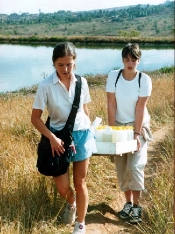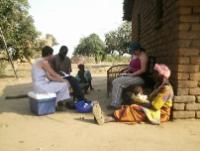Public & environmental health
Research in environmental health develops the interface between environmental engineering and public health. We have particular strengths in:
- mechanisms of infection by microorganisms and the risk to public health
- antibiotic resistance
- human health in developing nations
- air quality and human health
- food safety
Antimicrobial / antibiotic resistance

Work related to antimicrobial resistance evolves from pharmaceutical eco-toxicology with the development of microbial-community endpoints, and this has resulted in international exposure and award-winning publications (including Best Paper in ES&T 2009).
We investigate these PEC (pollutants of emerging concern), as they represent a contemporary global problem.
Key people: Charles Knapp
Human disease cause by the free-living amoeba, Acanthamoeba
We explore potential pathways of infection by free-living amoeba. For example, Contamination of contact lenses with the organism occurs mainly due to poor lens hygiene on behalf of the wearer. For example, rinsing lenses in tap, where the organism is commonly found, or using inefficient lens disinfection systems.
Once contaminated, the lens acts as a mechanical vector transferring the organism onto the eye surface where subsequent infection can occur.
We’ve investigated adhesion of the organism to different lens materials, specifically:
- newer silicone hydrogel materials
- the efficacy of lens disinfection systems
- the environmental presence of the organism
The ecology of Legionella species in compost and the potential public health risk

Legionella, primarily Legionella pneumophila, is the main causative agent for Legionnaires’ disease which is an infection typically associated with inhalation of contaminated water droplets. However other species of Legionella are known to be pathogenic.
In the southern hemisphere Legionella longbeachae, often associated with composts and potting soils, is a common causative agent for human disease. This route of infection up until recently has rarely been documented in the northern hemisphere. However an increasing number of cases of infection have been noted in Europe, in particular Scotland, and North America.
Studies investigating the aetiology of Legionella infection have concentrated on L. pneumophila and water sources, while minimal work has looked at other sources of infection, e.g. research on the presence of these organisms in compost in Europe are limited.
Our researchers are the first to undertake a large scale survey of commercial available composts in the UK to establish habitation by these organisms.
Key people: Tara Beattie
Food safety research

Our research focuses on the development of food safety management system based on the Hazard Analysis Critical Control Point (HACCP) principles. This research examines the compliance of HACCP principles using national guidance systems, and the development of a food system for food business operators in developing countries such as Malawi.
Another topic of food research centres on the use of monosodium glutamate (MSG) in Chinese meals. MSG is used as a flavour enhancer in a variety of foods prepared by food manufacturers and restaurants, and in particular, Chinese catering businesses.
In collaboration with the Scottish local authorities, this research investigates national and European compliance of MSG level in Chinese food, and to change the behaviour of food business operators and environmental health officers on MSG in food.
Research in the developing world
Research extends further afield to the developing world, again with a focus on water, food, and public health. The majority of our research has been done in Malawi in collaboration with the University of Malawi – The Polytechnic.
Funding for this work has been secured from the Royal Environmental Health Institute of Scotland and the Scottish Government. In the latest round of Scottish Government International Development Programme grants, funding was obtained to continue the work of the Scotland Chikhwawa Health Initiative for 2013-2016.
This most recent project will focus on implementing the Healthy Settings principles within the district of Chikhwawa in southern Malawi. Find out more about the Chikhwawa Project.
Key people: Bob Kalin, Tracey Morse, Tara Beattie
Chikwawa project (Malawi)
The University of Strathclyde has worked with Chikhwawa District Health Office in preventative health projects for over 15 years through environmental health links.
These community health projects have included:
- research and interventions in remote rural areas including elements of maternal health
- water and sanitation
- disease control and prevention, through health education, capacity building and supporting capital investment
Find out more about the Chikwawa project.
Key people: Tracey Morse, Tara Beattie
Air quality & human health

Air quality research looks at development and evaluation of methods to provide accurate and extensive exposure estimates in environmental epidemiology studies of the health effects of pollution in urban areas.
This research is closely linked to research on transport engineering.
Specific research projects include:
- the estimation of human exposure to traffic-related air pollutants
- epidemiological analyses of the contrasting effects of short, intermediate and long-term exposure to air pollutants on the population of Scotland
This research includes evaluation of the health effects of relatively high traffic-related air pollution exposures on participants in extant public health epidemiological projects in the Glasgow urban area in collaboration with the University of Glasgow and the MRC Social and Public Health Studies Unit.
Funding has been obtained from NERC, Department of Health (NIHR), MRC, the Colt Foundation and the Royal Environmental Health Institute of Scotland. Through these and other research grants research consortia been established with the universities of Edinburgh, Glasgow and Manchester and the London School of Hygiene and Tropical Medicine.
Key people: Iain Beverland